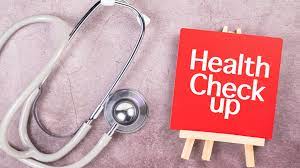- Empty cart.
- Continue Shopping
The Importance of Regular Check-ups

Regular check-ups, also known as routine health screenings or preventive medical examinations, are a fundamental aspect of maintaining good health and preventing potential health issues. These appointments with healthcare providers are not just for when you’re feeling unwell; they play a crucial role in early detection, disease prevention, and overall well-being.
Early Detection of Health Issues
One of the primary benefits of regular check-ups is the early detection of health issues. Many health conditions, including cancer, heart disease, diabetes, and hypertension, often have no noticeable symptoms in their early stages. Regular screenings and check-ups enable healthcare providers to identify these conditions before they progress to a more advanced and potentially harder-to-treat stage. Early detection can lead to more effective interventions and improved outcomes.
Preventive Care and Disease Prevention
Preventive care is a key focus of regular check-ups. Healthcare providers can offer guidance on maintaining a healthy lifestyle, including advice on diet, exercise, and immunizations. They can also provide screenings and tests to assess your risk factors for certain diseases. By addressing risk factors and adopting preventive measures early, you can reduce your chances of developing chronic conditions and lead a healthier life.
Personalized Health Assessment
Regular check-ups allow for a personalized health assessment tailored to your age, sex, family history, and individual risk factors. Healthcare providers can create a health profile for you, which includes your medical history, current health status, and risk factors. This information helps in identifying specific health concerns and tailoring recommendations and interventions to your unique needs.
Building a Relationship with Healthcare Providers
Establishing an ongoing relationship with a primary care physician or healthcare provider through regular check-ups is invaluable. This relationship allows your healthcare provider to get to know you and your health history better. They can provide more personalized care, offer guidance on managing chronic conditions, and address any health concerns or questions you may have.
Monitoring Chronic Conditions
For individuals with chronic conditions such as diabetes, hypertension, or heart disease, regular check-ups are essential for monitoring the condition’s progression and adjusting treatment plans as needed. This ongoing care helps individuals manage their conditions effectively and avoid complications.
Mental Health and Well-Being
Regular check-ups also encompass mental health assessments. Mental health is an integral part of overall well-being, and discussing your mental health with a healthcare provider can help identify and address issues such as anxiety, depression, or stress. Early intervention and support can significantly improve mental health outcomes.
Health Maintenance Across the Lifespan
Regular check-ups are essential at every stage of life. From childhood vaccinations to adolescent health, reproductive health, and senior care, routine health screenings evolve to address age-specific needs and challenges. Regular check-ups ensure that individuals receive appropriate care and guidance throughout their lifespan.
In conclusion, Regular check-ups are a proactive and essential part of maintaining good health and well-being. They empower individuals to take charge of their health, detect potential issues early, and prevent diseases before they become more serious. Remember that your healthcare provider is your partner in health, and open communication during check-ups is vital. By scheduling and attending regular check-ups, you invest in your long-term health and quality of life, making it one of the most important steps you can take towards a healthier future.








